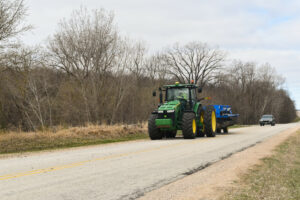As days get warmer, the itch to hit the field gets stronger. It’s springtime in Wisconsin, which means planting season is getting underway for farmers across the state.
Traveling with agricultural equipment on the road poses an increased hazard that is often a dreaded part of farming. It is critical that farmers ensure their vehicles meet legal requirements and operate safely while sharing roadways with their fellow motorists.
“Everyone is busy – and during the busy seasons, it’s easy to get impatient with farmers on the road,” said Wisconsin Farm Bureau President Brad Olson. “Staying vigilant and patient on the roadway is a responsibility all motorists share. At the end of a long hard day, we all want to make it home safe to our families.”
Commit to staying safe on the road this spring with these five mindful tips:
Make Smart Decisions
Follow safe, smart driving practices at all times. Before attempting to pass in a no-passing zone, know that is illegal to pass an IOH including farm tractors and farm machinery or an agricultural commercial motor vehicle (Ag CMV).
Motorists should wait to pass a slow-moving vehicle until they have safely entered a passing zone. Farmers should not pull over in a no-passing zone to let vehicles pass unless the road shoulder condition and width can allow for the farm machinery to completely move onto the shoulder.
Farmers also should not wave a driver forward to pass. While these actions seem courteous, it sends mixed signals and is not encouraged. In a passing zone, or if the shoulder width permits, farmers are obligated to yield the roadway to an overtaking vehicle so they do not impede the normal movement of traffic.
Be Alert
Stay alert while driving, as you never know when you’ll meet farm equipment on the road.
The Wisconsin Department of Transportation recommends that motorists should slow down immediately whenever they see a slow-moving vehicle emblem (orange and red triangle) on the rear of a tractor or other piece of equipment. This emblem indicates that the farm machine usually travels slower than 25 mph. Stay alert, focused and patient when passing a slow-moving agricultural vehicle in an area where passing is legal.
Watch Out
Watch out for unexpected turns into field driveway, as it is more likely for farm equipment to turn there than at an intersection. It can turn into a dangerous situation when a farmer is attempting to make a left-hand turn. Farm equipment, especially the tractor, will have two flashing amber or yellow lights on the cab or tire fenders of the tractor when on the roadway. When a farmer signals to turn, the light will continue to flash in the direction the farmer is turning. The other light will go solid.
Farmers are asked to comply with the proper lighting and marking requirements to draw attention to the size, shape and speed of agricultural vehicles and to alert motorists that caution is required. There are specific requirements for different types of equipment. This information can be found here.
Leave Space
When a motorist legally passes large farm equipment within a short distance of a controlled intersection (stop sign or stop lights), this action can dramatically impact the reaction time and braking distance for the farmer. Farm equipment is heavier than a passenger vehicle, which makes it critical to have adequate braking distance.
Don’t Assume
Don’t assume that because you can see the farmer that they can see you. Blind spots are common on farm equipment. Accident risks are highest when equipment is backing up or moving in an area with limited space or turn radiuses.
“Safe roads not only protect lives but also support the long-term viability of farms and rural communities. It is about fostering a culture of shared responsibility for the well-being of our communities,” added Olson.


